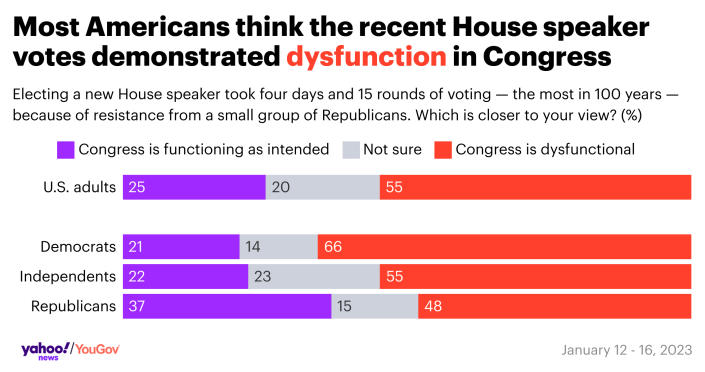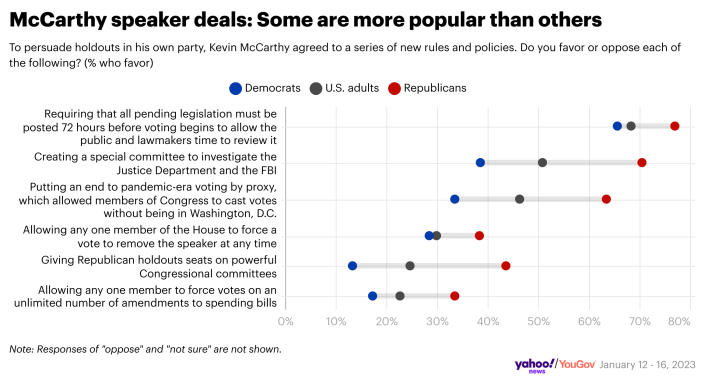
By a huge 30-point margin, Americans say Republicans’ protracted battle earlier this month to elect a new speaker in the House of Representatives is a sign that “Congress is dysfunctional” (55%) rather than “functions as intended” (25%), according to a new Yahoo News/YouGov poll.
And that is likely a harbinger of trouble ahead as the United States breaches its debt limit and heads for another dramatic clash on Capitol Hill in the coming weeks.
Even among Republicans, more people see the recent speaker deadlock — described in the survey as “15 rounds of voting — the most in 100 years — due to opposition from a small group of Republicans” — as evidence that Congress is dysfunctional (48%) rather than of functional (37%).
When the US officially hit the debt ceiling on Thursday, Treasury Secretary Janet Yellen said she would have to take “extraordinary measures” to avoid a financial collapse and urged congressional leaders to “immediately” raise the country’s borrowing limit . (Raising the limit allows the federal government to cover spending it has already approved to avoid a catastrophic bankruptcy that could wipe out $15 trillion in wealth and cost as many as 6 million jobs, according to one recent estimate.)

Still, conservative House Republicans — again encouraged by their success in extending the speaker’s battle and by pledges made by the eventual winner, Rep. California’s Kevin McCarthy reportedly did to secure their votes – hefty budget cuts in exchange for making the government pay. his past debts. In contrast, the Biden administration says it will not negotiate and is instead pushing for a “clean” increase of the kind Republicans approved three times while Donald Trump was president.
The new Yahoo News/YouGov survey of 1,538 US adults, conducted Jan. 12-16, found nearly twice as many in favor of the Biden position (“a traditional ‘clean’ debt limit vote with no new policy demands,” on 45%) than in favor of the right-wing Republican position (“linking new policy demands to the debt limit vote”, with 24%) As might be expected, Democrats favor the Biden position by a wide margin (61% to 19%) — but again, even Republicans aren’t exactly in favor of future debt limits, with 35% favoring a clean vote and 36% favoring policy demands.
In addition, conservative demands for cuts may well lose further public favor once conservatives announce which federal programs they actually want to cut. Of the choices offered in the poll — which reflect the latest reporting on possible GOP demands — cuts in federal spending for “aiding Ukraine in the war with Russia” (44% in favour) are the only proposal that will even support support. approached by the majority. The rest — cuts to the U.S. military (22%), Social Security (10%), or Medicare (9%) — don’t even come close.

And while a majority of Republicans support cuts in aid to Ukraine (63%), the share who want to cut spending on the military (15%), Social Security (12%), or Medicare (12%) ) about as miniscule as it is among Americans as a whole.
Complicating matters for House conservatives is the fact that many Americans don’t really understand what the debt limit is all about — but the more they learn, the less they want Congress to hold it hostage. For example, less than half of American adults (42%) understand well that the debt limit should be increased “to allow the federal government to pay for expenses already approved by Congress”; more either say the US regularly raises the debt limit “to allow for new federal spending” (25%) or aren’t sure (33%).
In that light, it’s not surprising that when Yahoo News and YouGov asked a random half of respondents whether they were “for or against raising the US debt limit” – with no additional context – more said they were against it (40% ) than said they favored it (28%). But when the other half was asked the same question after hearing a description of the most likely consequences – “defaulting on America’s past debts” and failing to pay “Social Security benefits and military salaries” while “a potential recession is underway brought” – turned the numbers around completely, with 45% now saying they are in favor of raising the limit and only 24% saying they are against.

And meanwhile, about a third of Americans say they’re “not sure” how to respond to questions about the debt limit — suggesting that opposition to the GOP’s hardball tactics has even more room to grow as the U.S. moves into fails and the worst economists predictions come true.
As a result, Speaker McCarthy has to do his job for the future. For now, many Americans (43%) and Republicans (47%) are not sure whether they rate him favorably or unfavorably, nor are they sure whether they approve or disapprove of the work he does as a speaker (45% and 47%). % not sure, respectively).
But McCarthy’s early ratings among all US adults – 20% favorable vs 37% unfavorable; 24% approve vs. 31% disapprove — is generally negative. And Republicans and Republican independents are divided on whether the House GOP should have chosen McCarthy (32%) or someone else (31%) as speaker.
At the same time, a significant number of Americans opposed many of the reported concessions the Californian made to “convince beliefs in his own party,” including giving seats to the anti-McCarthy stragglers on powerful committees (42% against, 24% proponent); allow any member to force votes on an unlimited number of amendments to bills (42% oppose, 23% favor); and allow any member to force a vote to remove the speaker at any time (37% oppose, 30% in favour).

However, other reported concessions are more popular: publishing legislation at least 72 hours before a vote to give lawmakers time to review it (68% in favour, 10% against); creation of a special commission to investigate the Justice Department and the FBI (51% in favour, 27% against); and ending congressional voting by proxy during the pandemic, allowing members of Congress to vote without being in Washington, D.C. (46% in favour, 29% against).
For McCarthy to succeed, the trick is to appease the most extreme members of his party without giving in to their least popular demands. After the recent row with House speakers, only 26% of Americans say Republicans “have the priorities right” – 5 points less than at the end of October – while more than twice as many (54%) say they “don’t have enough pay attention to America’s real problems.”
Democrats’ perceptions aren’t that bad — 30% “have the priorities right” versus 52% “don’t pay enough attention to America’s real problems” — with no significant change since August.
Similarly, Americans are now 20 percent more likely to say Republicans have more interest in “damaging” the other party (48 percent) than “passing legislation” (28 percent). 42% and 36% respectively.
_________
The Yahoo News survey was conducted by YouGov using a nationally representative sample of 1,538 U.S. adults who were interviewed online from January 12 to 16, 2023. The sample was weighted by gender, age, race, education, 2020 election turnout, and presidential election, baseline party identification, and current state of voter registration. Demographic weighting targets are from the 2019 American Community Survey. Baseline party identification is the most recent respondent answer given before March 15, 2022 and is weighted by the estimated distribution at that time (32% Democratic, 27% Republican). Respondents were selected from YouGov’s opt-in panel to be representative of all US adults. The margin of error is about 2.7%.

